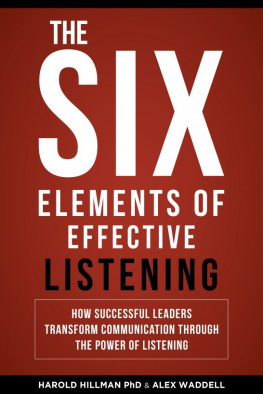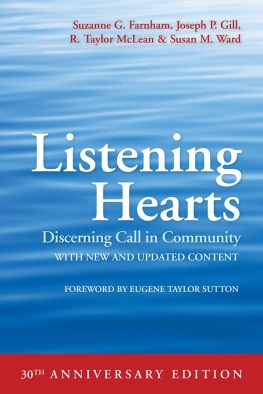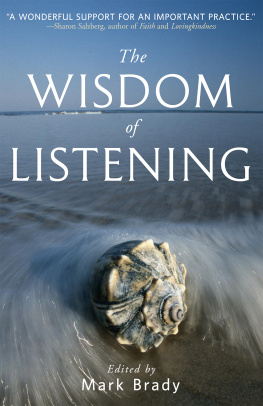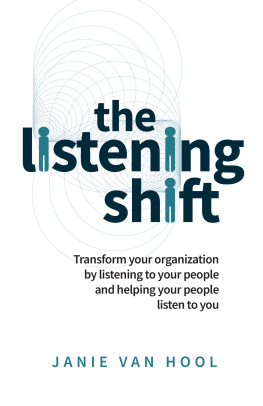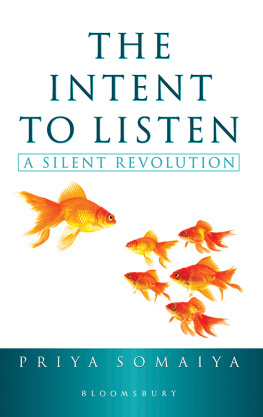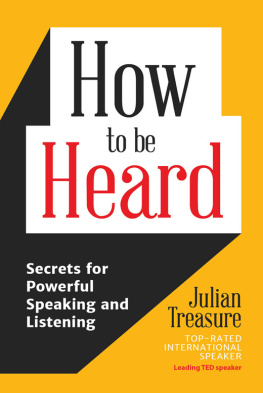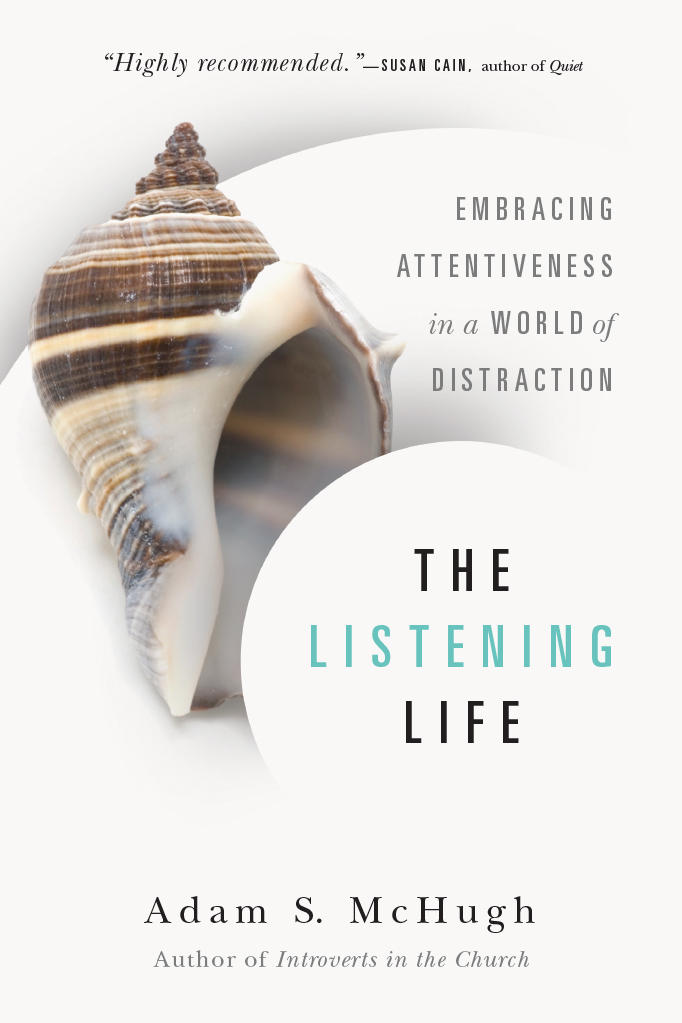three people who taught me how to be a listener, by listening to me.
Introduction
LISTENING COMES FIRST. In this life, you listen even before you are aware of it. From within the womb an unborn child is already listening to the voices of her parents. After her birth, she will spend the next months hearing the words they speak, whisper and sing to her, until one day she will start echoing those words, one imperfect syllable at a time.
To master a foreign language we must hear it spoken by others before we can reproduce the sounds our ears have heard. Virtuoso musicians in their early years are immersed in music, hearing the chord progressions and melodies that will lodge in their souls and, one day, sound from their instruments. Much of our formative years is spent in classrooms listening to teachers, in homes listening to our parents and in church listening to the stories the Bible tells us.
When we meet the primeval universe in Genesis, we learn that it is unformed and chaotic but that somehow it has an ear, because its first action is to listen to the Voice that pierces the darkness. God commands light and the cosmos hears and obeys, and through its acts of listening, order and harmony supplant the watery abyss. Six days into the making of this listening world, God creates the first humans, and their original act is to hear the blessing to populate the earth with other image-bearers and God-listeners. Listening is foundational to what it means to be human.
Throughout the Bible listening is the central act of the people of God. They are those who are gathered and formed by his voice and held together by his word. They hear his promises and judgments, instructions and warnings, reassurances and exhortations.
The centerpiece of Israels prayer life, the Shema, begins with the word hear: Hear, O Israel: The L ORD our God, the L ORD is one (Deuteronomy 6:4 NIV ). The Hebrew word shema means hear. Jewish children are instructed to rehearse these words as they rise in the morning and as they fall asleep. From dawn until dusk their lives are made by listening.
You become a disciple by hearing. Listening is the first act of discipleship as fishermen drop their nets and follow when Jesus calls, and listening is the core of their apprenticeship as they listen their way from Galilee to Jerusalem. Paul reminds us that hearing must come before faith, indeed that faith proceeds from hearing. How can someone believe, he presses, in someone they have never heard of? So faith comes from what is heard, and what is heard comes through the word of Christ (Romans 10:17). The apostle James famously counsels his hearers to be quick to listen, slow to speak (James 1:19). Ancient wisdom cautions us that if one gives answer before hearing, it is folly and shame (Proverbs 18:13). This is the pattern that life commands. Listen before you speak. Learn before you teach. Hear the call before you lead. Absorb the word before you preach it.
But somewhere along the way we start to violate the natural order of things. Speaking our minds and asserting ourselves take priority over listening. We interrupt someone else because we are convinced we already know what he or she is going to say. We begin to take up more space than we allow for others. We consider ourselves experts on topics without anything more to learn. We tell God what to give rather than asking what God wants to give. We participate by speaking and sharing, and we assert our identities by taking verbal stands. We shout our messages from the rooftops without knowing who is listening and what they need. We view others as projects rather than people with unique stories to be heard. We consider our great Christian task to be preaching, rather than assuming the listening posture of a servant. We speak volumes, but we listen in snippets.
When this reversal of the pattern persists, we find ourselves building lives that shelter us from having to truly listen. We may move into churches and neighborhoods full of people whose views parallel our own, avoiding the dissonance created by contrasting voices by constructing theological and social echo chambers. We crystallize our beliefs and cease to ask questions. The great hope of the Internet has been that dialogue will prevail, that people with different theologies, worldviews and politics will log in to learn, grow and communicate with those who disagree with them. Yet it would seem that social media has helped people connect with like-minded people, and the unfortunate consequence has been the intensifying and radicalizing of beliefs and the deeper entrenchment of peoples beliefs. We settle into our own little truth corners.
What the Bible portrays as a household of faith instead becomes a scattering of encampments, people who warm themselves by their own fires, whoop with their own war cries, listen solely to their appointed leaders and only interact with the other camps when firing arrows.
Psychology professor David Benner says that a major obstacle to growth in our listening abilities is that most of us already think that were good listeners. This book is predicated on the assumption that most of us are not good listeners. Therapists I know say that many of their clients meet with them simply because they are not being listened to in their most important relationships. Without diminishing the value of professional therapy, I would argue that the fact that we pay millions of dollars annually for people to listen to us indicates our poverty in this arena. Everyone is talking, but so few people are truly being heard.
We need to learn how to listen because all the talking in the world will not make our relationships what we want them to be, and it will not make us into the sort of people we want to be. Our longings for intimacy will not be satisfied through one-way conversations and interactions that feel like competitions. Our desire to be transformed will not be met through giving voice to all the noise in our souls. Our identities will not be discovered in finding our own voice independent of others but in helping others find their voices.
We learn how to listen because we want to learn how to love. We want to learn how to practice hospitality, how to truly welcome people into our lives. We want to be story-hearers and not just storytellers. We want to find the internal quiet and stillness that will open us to being changed. We want to learn how to listen because we want to become more human.
I didnt get serious about listening until I realized I wasnt good looking enough to get women to pay attention to me any other way. I am not proud to admit this. In college I borrowed a copy of Men Are from Mars, Women Are from Venus from a friend. Actually, I took it from her dorm room without telling her because I was embarrassed to be reading it. I still have it. In that book I learned that women are listeners and men are problem solvers. I would later dismiss that as a gender stereotype, but at the time I used it to stop trying to fix everything and just be with people. I wooed women with eye contact, paraphrasing and active listening sounds.
Listening at the start of a relationship is easy. In the early months there is no way you can anticipate future conversations when you sit gripping the arms of your chair, teeth marks on your tongue, summoning all your will power to keep from interrupting someone saying something you disagree with. In those moments the God-given ratio of two ears to one mouth seems highly unjust. But that is when the work of true listening really begins. Its one thing to listen at the beginning of our relationships, but its another thing entirely to




